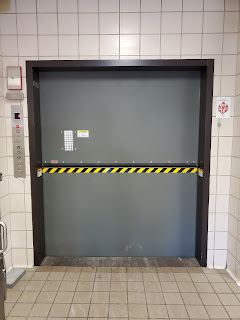As of 5/25/21 the State of Illinois adopted A17.1 2019 which means we require all sorts of new gizmos including a new style 3D door scan. This means 2 things; you get a safer elevator and it will be more expensive.
In the State of Illinois we are required to install 3D door scans when:
1. We replace a safe edge or electric eye
2. We modernize an elevator system
3. We install a new construction elevator
In the State of Illinois we are not required to install a 3D door scan when:
1. We replace it for a like door scan
How does it work? Detection of approaching objects
Detection of approaching objects/persons is now mandatory. The aim is to ensure that approaching objects trigger the doors to open, thus reducing chances of being hit by the closing elevator doors. The code states that an object of an 8" diameter and 40" height will need to be detected at an approaching speed of up to 3 ft/s within a defined detection zone.
The design requirements within the code call out the detection of ‘ultra-flat matte black’ and ‘glossy white’ color targets. As matte black surfaces absorb infrared (IR), conventional 3D detection solutions based on IR technology will be unable to detect the target.
The detection zone, wherein objects must be detected when moving towards the doors, is described as between 20” and 9” from the landing side face of the hoist way door and 9” ahead of the leading edges of the doors. This area will decrease in size as the doors begin to shut. Once the leading edge of the doors are within 18” of the fully closed position, the detection device is permitted to become inoperative, unless there is a 2D trigger before the doors are fully closed.
Rendering inoperative of a 3D detection means
The rendering inoperative requirement for 3D detection focuses on 2 things:
1. Once the leading edge of the doors are 18” from the closing point (i.e. the other door or door jamb) the 3D detection device is permitted to become temporarily inoperative. For reference the 2D detection is required to stay active until 0.75” from the door / door jamb.
2. The second point relates to how long after a trigger the 3D detector is supposed to stay active. After the first 3D trigger the detection device is required to stay active for 20 seconds. Once the 20 seconds is over, the 3D detector is permitted to be made temporarily inoperative and the doors will begin to shut unless there is a trigger in the 2D detection zone whereby the 20 second count will begin again.
What does a 3D door scan do differently than a 2D door scan? The traditional 2D door scan rides on the elevator and will detect an object or person when it breaks the threshold of the elevator's car door. The intent of the code change is to catch a person or object so it doesn't get caught between the car door and hatch door. You know, when you run to catch an elevator and put your hand in the door way hoping the door reopens? We want to reopen the door so people's hands aren't getting caught in the hatch door if they don't break the car door beam.
What if I installed a 3D door scan years ago, do I comply? Probably not because that generation of door scans didn’t work very well. Some had cool light up colors, some had some promises, but most didn’t work to today’s code requirements.
Who sells 3D door scans? Lots of great vendors sell solutions for 3D. If I missed one, let me know so I can put a link up.
Formula Systems - Vision Plus - formula-systems.com/product/vision-plus/
Janus - Janus Smart 3D – avire-global.com/us/products/elevator-light-curtains/smart3d/
Cedes CabSafe - cedes.com/en/application-markets/elevators/
Unitech - Optiguard Shield - unitecparts.com/elevators/elevator-products/door-protection-device-optiguard/
Adams - Cedes IMS 100 NT - adamselevator.com/products_3d_door_sensor.asp
Testing & code requirement reference – Avire - avire-global.com/us/market-insights/3d-detector-requirements-in-asme-17-1-csa-b44-2019/
If you have any questions or would like additional information feel free to contact me at CraigZ@colleyelevator.com or 630-766-7230 ext. 107.

























